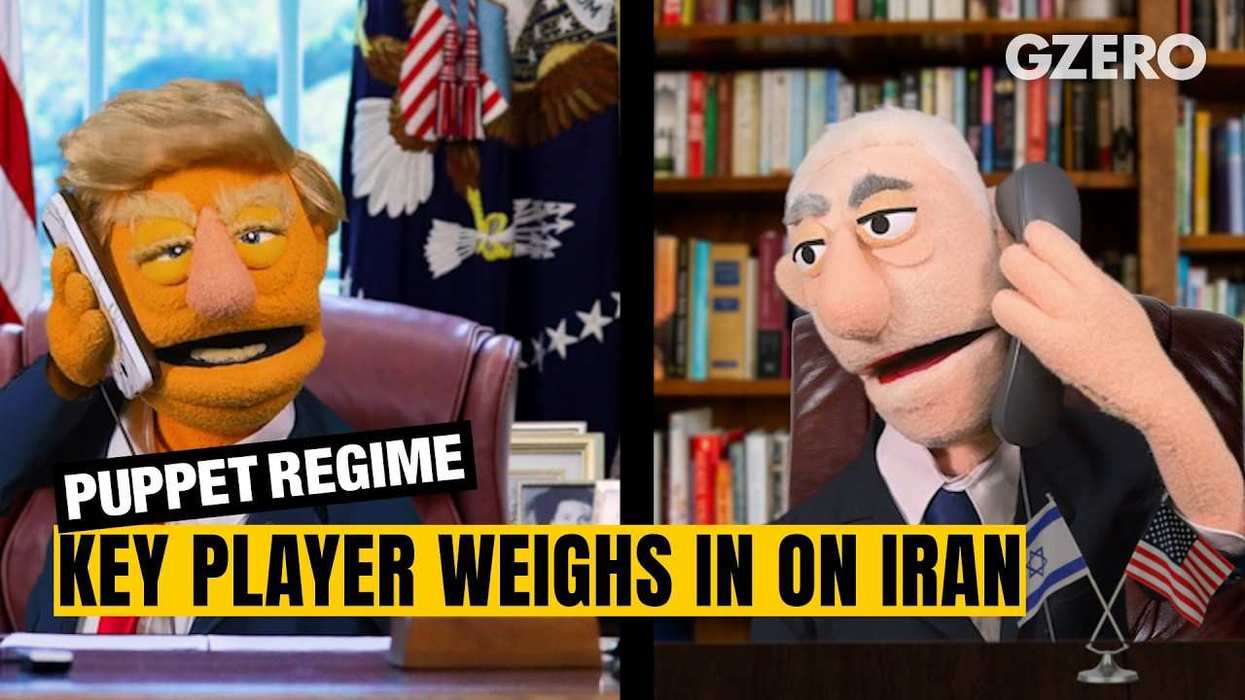VIDEOSGZERO World with Ian BremmerQuick TakePUPPET REGIMEIan ExplainsGZERO ReportsAsk IanGlobal Stage
Site Navigation
Search
Human content,
AI powered search.
Latest Stories
Sign up for GZERO Daily.
Get our latest updates and insights delivered to your inbox.
Global Stage: Live from Munich
WATCH RECORDING
Ian Bremmer's Quick Take: We are now two weeks into an Israel war in Gaza against Hamas. I guess if there's good news that it hasn't expanded beyond that, But aside from that, not very much good news to take away. Maybe the big picture for me is that this is the second serious global foreign policy crisis that we have seen during the Biden administration. And there are some very interesting comparisons and contrasts with them.
I mean, maybe the first thing to say is it's, you know, the last what is it been, almost 20 months? This is the first time that the Russia Ukraine crisis has been completely kicked off the headlines. No one asking me about Russia, Ukraine, over the last couple of weeks, even though that war continues apace. Plenty of civilians continue to get killed by Russian rockets and drones and lots of fighting on the front lines between the two militaries. But that is not the focus. The focus, of course, is what's happening in Gaza and just how much worse this can all get.
I guess one interesting comparison is that in both cases, President Biden is providing an enormous amount of public support and alignment with a leader that he does not really like or trust. In the case of Ukraine, not an ally, though a country that the United States has been aligned with, hasn't paid a lot of attention to it. And Zelensky himself, someone that Biden really did not feel had experienced to run the country, was presumptuous about, you know, sort of his need to be in to NATO and the Americans not doing enough for him and not listening to US intelligence in the run up to the war. Suddenly the Russians invade and Biden feels no choice, along with American allies, to be out there publicly and strongly supporting him, supporting democracy against an illegal and unprecedented Russian invasion.
In the case of Netanyahu, this is of course, the most important ally of the United States in the Middle East, has been for a very long time. But Biden does not support or like Netanyahu personally much at all. The farthest right wing coalition that Israel has had since independence, expanding their illegal settlements in the West Bank. Biden didn't want to even meet with him in person for a while. It was challenging to get a meeting set up on the sidelines of the United Nations General Assembly for example. Even though Biden wants to have a very strong, committed relationship with Israel, very different from the present government.
A big difference is, of course, in the case of Israel, it is the ally that the Americans are both actively supporting, but also trying to contain and constrain, as opposed to, in the case of the Russian invasion of Ukraine, it was trying to stop the Russians, the adversary, from a broad invasion into Ukraine. A very big difference, of course, is once the Russians invaded Ukraine, the United States did everything it could to support the Ukrainians. But absolutely wanted to stay out of the war no matter what. And so did American allies. And the US was very aligned with pretty much all of NATO in doing everything they could to stay out of the war, to avoid any possible escalation that could get the Americans fighting directly against the Russians. Hence, no no-fly zone. Hence, you know, concerns about what kind of significant offensive, advanced military equipment that would be provided to the Ukrainians, especially in the early months of the war. This was going to be a proxy fight, not a direct fight.
In the case of the Israel invasion of Gaza, there is a very strong feeling that the Americans will get involved in the war if the war expands. In other words, sending carrier groups directly to the Eastern Med, telling Iran, putting them on notice that if there's an expansive fight involving Hezbollah, involving Iranian proxies around the region, that the Americans will directly fire back. And so the likelihood that this war, if it expands, is going to involve the Americans directly is actually very high. That's one of the reasons why Biden has been so concerned about the potential of significant escalation. Now, there are clearly very strong efforts by Biden and by the Europeans to try to convince Netanyahu not to go ahead with a ground assault. And at least delay one significantly.
Lots of reasons for that. One is because you don't have sufficient humanitarian aid in place. And so where are those that million plus of Palestinians living in northern Gaza, the densely populated urban area that has more infrastructure? Where do they go? They go to the south. What if there's no food and supplies for them? There are no tent encampments set up. Where are they supposed to live? All of those are questions that have not yet been resolved, but can be resolved if you take more time. Can you get more citizens, civilians out of that areas of consequence, limit the civilian casualties? There's also the matter of 220 civilians that are still being held hostage, most of whom are still believed to be alive. You start a ground war, you're probably not getting many, if any, of them out alive. You wait, you can possibly get a lot more of them. Secure them if you had already had worked with the Qataris to get two American citizens that have been released by Hamas over the weekend. And finally, the widespread belief on the part of pretty much everyone in NATO that if Israel engages in a ground war, it's going to be very long, very bloody, and will lead to more radicalization of Palestinians, not just in Gaza but across the region in the West Bank.
Also, all those places where there are large numbers of refugees like Lebanon, like Syria, and on and on. So that is very different from where the Israelis are right now. And this is not just Netanyahu. It's not just his very far right-wing government. It's also the war cabinet. It's also experienced Israelis across the political spectrum. A majority of Israeli citizens support a ground offensive. About half of them think it should be a long lasting, very substantial one, but half think it should be shorter and sharper. And we'll see where that goes. But certainly I don't have any confidence that they're going to be able to forestall the Americans and allies this invasion for much longer. Couple more points here. Unlike in the Russian invasion of Ukraine, where the United States was aligned with everyone among the advanced industrial democracies to support the Ukrainians, and those policies were formulated together, here the Americans are basically by themselves.
The Europeans are all over the map in terms of how they feel about Israel, how they feel about the Palestinians, what should be next, no military support in the region, how do you feel about humanitarian support. It's a mess. And so as this war continues and likely expands, the Americans will be acting much more unilaterally, which is challenging both because it's a distraction from the Russian invasion of Ukraine and likely means that the United States will provide less support for the Ukrainians, undermining the strong trans-Atlantic ties that have been increasingly built over the last 20 months, but also because America's role in supporting Israel and supporting the Netanyahu government will be seen as misaligned with that policy of many of the core Europeans. So for both of those reasons, this really does play out more broadly. Anyway. An awful lot to think about. A very fast moving and very tragic set of events all set off on October 7th and all only getting worse over the last couple of weeks.
That's it for me and I'll talk to you all real soon.
Keep reading...Show less
More from Quick Take
Trump’s State of the Union address
February 25, 2026
Has US–Iran diplomacy reached its end?
February 23, 2026
Supreme Court blocks Trump’s tariff power
February 20, 2026
Why Trump is pushing to take Greenland
January 18, 2026
US response to Iran protests
January 12, 2026
Maduro ousted in US raid, a major win for Trump
January 03, 2026
GZERO Series
GZERO Daily: our free newsletter about global politics
Keep up with what’s going on around the world - and why it matters.















